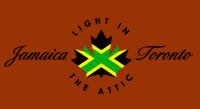 Canadian reggae and soul, eh? If you expect that combination to go down as easily as curried goat with a side of Canadian bacon, you may be surprised. By the late sixties, economic strains, liberalized Canadian immigration laws, and fear among draft-age men that a United States passport would lead straight to Vietnam led a growing number of Jamaican expatriates to relocate in Toronto. Just 236 miles from Motown, visionary keyboardist/ arranger Jackie Mittoo, who had already cofounded the Skatalites and served as music director at Jamaica’s Studio One, helped guide a gang of upstarts eager to mix their Island recipes with generous helpings of sweet soul and heavy funk. The Jamaicans in Toronto included rhythm king Wayne McGhie, gritty vocalists Johnny Osbourne and the Mighty Pope, dub-savvy crooner Noel Ellis (son of rocksteady legend Alton Ellis), and roots rocker Willi Williams, whose “Armagideon Time” (“versioned” from a Mittoo riff and showcased below) later became the Clash‘s most moving reggae cover. The Toronto scene produced music of surprising range and vision for almost two decades, and then seemingly disappeared.
Canadian reggae and soul, eh? If you expect that combination to go down as easily as curried goat with a side of Canadian bacon, you may be surprised. By the late sixties, economic strains, liberalized Canadian immigration laws, and fear among draft-age men that a United States passport would lead straight to Vietnam led a growing number of Jamaican expatriates to relocate in Toronto. Just 236 miles from Motown, visionary keyboardist/ arranger Jackie Mittoo, who had already cofounded the Skatalites and served as music director at Jamaica’s Studio One, helped guide a gang of upstarts eager to mix their Island recipes with generous helpings of sweet soul and heavy funk. The Jamaicans in Toronto included rhythm king Wayne McGhie, gritty vocalists Johnny Osbourne and the Mighty Pope, dub-savvy crooner Noel Ellis (son of rocksteady legend Alton Ellis), and roots rocker Willi Williams, whose “Armagideon Time” (“versioned” from a Mittoo riff and showcased below) later became the Clash‘s most moving reggae cover. The Toronto scene produced music of surprising range and vision for almost two decades, and then seemingly disappeared.
Thanks to Vancouver-based music historian Sipreano (AKA Kevin Howes) this vibrant body of work has been brought back from cultural extinction. The innovative small label Light in the Atttic—whose catalog includes everything from Brazilian iconoclasts Os Mutantes to the Velvets-meets-Roky apocalyptic sound of Austin’s Black Angels—has released two fascinating anthologies and reissued several crucial solo albums (by Mittoo, McGhie and Noel Ellis) chronicling the best of the Toronto scene. Last year’s mostly soul and funk-centered Jamaica to Toronto anthology, discussed more below, already ranks as one of my favorite music collections released in the Zeroes. Worth the price all by themselves are the tracks by Jo-Jo and the Fugitives—the righteous wanderers’ anthem “Fugitive Song,†and the delicious, McGhie-penned “Chips/ Chicken/ Banana Split,†whose huge break-beat deserves a place on your ultimate chicken dance playlist alongside the Meters’ “Chicken Strut” and Cibo Matto’s “Know Your Chicken.â€
[audio:http://stuckbetweenstations.org/wp-content/uploads/2007/12/01-fugitive-song-1.mp3]
Jo-Jo and the Fugitives, Fugitive Song
[audio:http://stuckbetweenstations.org/wp-content/uploads/2007/12/03-chips-chicken-banana-split.mp3]
Jo-Jo and the Fugitives, Chips/Chicken/Banana Split
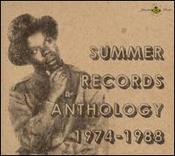 The new Summer Records Anthology, 1974-1988, captures Toronto’s homegrown reggae as it traversed the path that Sipreano describes as “dub to digital,†although only Unique Madoo’s spirited dancehall workout “Call Me Nobody Else†really represents the latter. After a few tracks of Johnny Osbourne’s soulful crooning and house band Earth Roots and Water’s supple rhythms, it becomes easy to forget that Lee Perry’s Black Ark Studio, which operated around the same years, was thousands of miles away. An interesting short film (excerpts below) accompanies the anthology. In it, Summer Records vocalist/ impresario Jerry Brown, Willi Williams, and Jackie Mittoo weave a cosmic, rhythmic and economic thread that connects dub reggae, bicycling and auto body repair. Did you really think those rat-a-tats were just random noises?
The new Summer Records Anthology, 1974-1988, captures Toronto’s homegrown reggae as it traversed the path that Sipreano describes as “dub to digital,†although only Unique Madoo’s spirited dancehall workout “Call Me Nobody Else†really represents the latter. After a few tracks of Johnny Osbourne’s soulful crooning and house band Earth Roots and Water’s supple rhythms, it becomes easy to forget that Lee Perry’s Black Ark Studio, which operated around the same years, was thousands of miles away. An interesting short film (excerpts below) accompanies the anthology. In it, Summer Records vocalist/ impresario Jerry Brown, Willi Williams, and Jackie Mittoo weave a cosmic, rhythmic and economic thread that connects dub reggae, bicycling and auto body repair. Did you really think those rat-a-tats were just random noises?
Summer Sound in Canada, Part 1
Summer Sound in Canada, Part 2
(Part 3 of the movie is available on YouTube.)
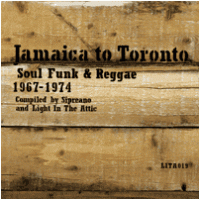 The earlier Jamaica to Toronto anthology is subtitled Soul, Funk and Reggae, 1967 -1974 even though one of its best songs, Noel Ellis’s reverb-heavy hymn to the homeland, “Memories,†wasn’t recorded until 1983. The collection is almost an embarrassment of riches, and while the Jamaican roots of the music here sometimes take repeated listens to grasp, even its lesser material shines. For example, Mac Davis’s early-seventies clinker “I Believe in Music†gets a large infusion of stellar Sam and Dave-like soul crooning—and if you find yourself on Toronto’s Eglinton Street, you can get a haircut at Jimmy Wisdom’s barbershop and ask him about it. And the stronger material can stand proudly with the best that Memphis and Motown offered during the same period. The vocal turn on “If This is Love (I’d Rather Be Lonely)†by Eddie Spencer, formerly of Jamaican ska ensemble the Sheiks, makes me forget about the Precisions’ more familiar version. Decades before anyone knew the word “mashup,†the Cougars matched a smoldering version of the Temptations’ “I Wish it Would Rain†with a rhythm drawn from the Band’s “Up on Cripple Creek.â€
The earlier Jamaica to Toronto anthology is subtitled Soul, Funk and Reggae, 1967 -1974 even though one of its best songs, Noel Ellis’s reverb-heavy hymn to the homeland, “Memories,†wasn’t recorded until 1983. The collection is almost an embarrassment of riches, and while the Jamaican roots of the music here sometimes take repeated listens to grasp, even its lesser material shines. For example, Mac Davis’s early-seventies clinker “I Believe in Music†gets a large infusion of stellar Sam and Dave-like soul crooning—and if you find yourself on Toronto’s Eglinton Street, you can get a haircut at Jimmy Wisdom’s barbershop and ask him about it. And the stronger material can stand proudly with the best that Memphis and Motown offered during the same period. The vocal turn on “If This is Love (I’d Rather Be Lonely)†by Eddie Spencer, formerly of Jamaican ska ensemble the Sheiks, makes me forget about the Precisions’ more familiar version. Decades before anyone knew the word “mashup,†the Cougars matched a smoldering version of the Temptations’ “I Wish it Would Rain†with a rhythm drawn from the Band’s “Up on Cripple Creek.â€
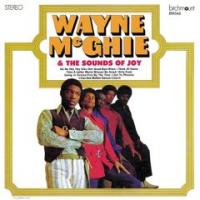 The enigmatic guitarist and vocalist Wayne McGhie provided the Jamaica-to-Toronto legend with its crispest rhythms, as well as its most absorbing side plot. Building upon his work with Jo-Jo and the Fugitives, McGhie in 1970 released an engrossing and barely-heard mélange of funk, soul and reggae grooves, Wayne McGhie and the Sounds of Joy, which will taste like manna for anyone who enjoys the Meters. A fire at a record pressing plant several months after the record’s release destroyed any chance it had for commercial success. But it’s hard to keep a good beat down, and by the nineties, interest among hip-hop musicians such as Q-Tip of A Tribe Called Quest and Buck 65—especially in the self-explanatory instrumental “Dirty Funkâ€â€”helped cement the album’s reputation as the “Holy Grail†of Canadian funk and allow collectors to garner more than $600 a copy. Sipreano spent two years trying to track McGhie down before the snowy meeting in 2004 where he agreed to let Light in the Attic bring back the grail. The payoff comes in deep soul grooves, like those on “Fire (She Need Water).â€
The enigmatic guitarist and vocalist Wayne McGhie provided the Jamaica-to-Toronto legend with its crispest rhythms, as well as its most absorbing side plot. Building upon his work with Jo-Jo and the Fugitives, McGhie in 1970 released an engrossing and barely-heard mélange of funk, soul and reggae grooves, Wayne McGhie and the Sounds of Joy, which will taste like manna for anyone who enjoys the Meters. A fire at a record pressing plant several months after the record’s release destroyed any chance it had for commercial success. But it’s hard to keep a good beat down, and by the nineties, interest among hip-hop musicians such as Q-Tip of A Tribe Called Quest and Buck 65—especially in the self-explanatory instrumental “Dirty Funkâ€â€”helped cement the album’s reputation as the “Holy Grail†of Canadian funk and allow collectors to garner more than $600 a copy. Sipreano spent two years trying to track McGhie down before the snowy meeting in 2004 where he agreed to let Light in the Attic bring back the grail. The payoff comes in deep soul grooves, like those on “Fire (She Need Water).â€
[audio:http://stuckbetweenstations.org/wp-content/uploads/2007/12/11-fire-she-need-water.mp3]
Wayne McGhie and the Sounds of Joy, Fire (She Need Water)
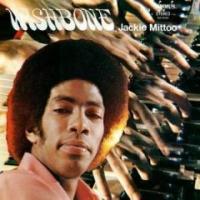 My only minor disappointment with the Jamaica-to-Toronto project is that the re-released solo work of Jackie Mittoo, who died of cancer in 1990, only hints at his genius. On the wide-ranging 1971 album Wishbone, it’s clear that he was aiming to produce an “important†record, one whose intricacy could stand next to the lush arrangements of Van Dyke Parks or George Martin (the title track even references the Beatles’ “Carry that Weightâ€). Sometimes the results are a bit underachieving for a pioneer of Mittoo’s caliber. “Grand Funk†is decent enough, but sounds like it was blessed by Carlos Santana rather than Jah. A few other tracks are so sugary that they come close to the lounge-funk mood associated with seventies porn soundtracks (a product that Light in the Attic puzzlingly also has in its catalog). I suspect that Andre 3000 has every lick of this album memorized, for better and for worse. But I’m only quibbling; there are also moments of real elegance and grace that fuse gospel, soul and reggae into one shimmering concoction.
My only minor disappointment with the Jamaica-to-Toronto project is that the re-released solo work of Jackie Mittoo, who died of cancer in 1990, only hints at his genius. On the wide-ranging 1971 album Wishbone, it’s clear that he was aiming to produce an “important†record, one whose intricacy could stand next to the lush arrangements of Van Dyke Parks or George Martin (the title track even references the Beatles’ “Carry that Weightâ€). Sometimes the results are a bit underachieving for a pioneer of Mittoo’s caliber. “Grand Funk†is decent enough, but sounds like it was blessed by Carlos Santana rather than Jah. A few other tracks are so sugary that they come close to the lounge-funk mood associated with seventies porn soundtracks (a product that Light in the Attic puzzlingly also has in its catalog). I suspect that Andre 3000 has every lick of this album memorized, for better and for worse. But I’m only quibbling; there are also moments of real elegance and grace that fuse gospel, soul and reggae into one shimmering concoction.
[audio:http://stuckbetweenstations.org/wp-content/uploads/2007/12/09-soul-bird-1.mp3]
Jackie Mittoo, Soul Bird
Hearing Mittoo again also inspired me to reach back into his timeless work at Jamaica’s Studio One, where he was not only its “music director’ and keyboard master, but its heart and soul. Studio One, where everyone from Bob Marley to Burning Spear got an early start, emerged out of the Downbeat Sound System that Clement “Coxsone†Dodd set up in the fifties, first to play American R&B records and later, to showcase Jamaican musicians. At least as much as bassist James Jamerson at Motown and fellow organist Booker T. at Stax, Mittoo shaped Studio One records into a signature sound; he did more than just about anyone to move the music from the workaday rhythms of ska and rocksteady to the ethereal rhythms of reggae.
If there’s one Mittoo cut that stands out for me as one for the ages, it is probably the deceptively simple 1967 instrumental “Real Rock,†cut with the Studio One’s house band, called the Soul Vendors or the Sound Dimension. Playing on one of Jamaica’s first Hammond B3 organs, Mittoo set the mood with a spooky riff that gives way to taut, controlled explosions of bass and drum. Since then “Real Rock†has proved to be a viral rhythm with a life of its own. In 1979, Jamaica-to-Toronto transplant Willi Williams recast the “Real Rock†rhythm as a moving dirge to the downtrodden, turning it into the roots reggae standard “Armagideon Time.†Months later, on the B-side of the “London Calling†single, the Clash revised a crucial lyric (“remember to love Jahova/ and he will guide you†became “remember to kick it over/ no one will guide youâ€), turning the song into a punk anthem. During the eighties, both Williams and Noel Ellis released spaced-out dub versions of the song, dubbing it “Rocking Universally.†In the nineties, Brooklyn-based DJ Dr. Israel reworked the song again as “Armageddon Time,†a drum-and-bass workout that reflected the influence of punks, like Bad Brains, that found equal inspiration in reggae and the Clash.
The remarkable endurance of Mittoo’s simple keyboard riff is the stuff of inspiration: a simple Jamaican song template, born of American and Caribbean soul music, migrated to Canada to become a working class anthem, crossed the Atlantic to inspire British punk, crossed back to North America for more layered sonic exploration, and found its way into the urban dance mixes of the hip-hop generation. You could invent some really complicated, hyphenated description for this phenomenon. But I just like to call it “real rock.â€
Willi Williams, “Armagideon Timeâ€
The Clash, “Armagideon Timeâ€
Fantastic history lesson for us younger ones who have never heard of these great artists.
Thanks.